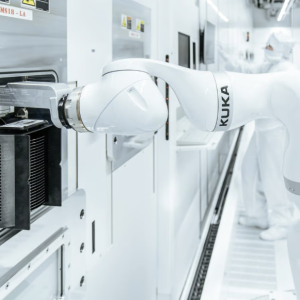
Employment Evolution in AI Age
Employment Evolution in AI Age
The story of work has always been one of change. From the first steam engines of the Industrial Revolution to global explosion of Internet in twentieth century, every major technological leap has reshaped people’s behaviors and actions in earning a money. In today’s world, with a huge advancement in artificial intelligence (AI), some people see it as a big turning point of humanity, while the others view it as a threat, but what is clear is that employment in the AI age is not disappearing – it is evolving.
At first glance, AI seems like a job thief. Machines now already possess an ability to write basic reports, generate code, and even drive cars. Routine jobs in factories, offices, and customer service are being controlled automatically by robots at a pace that we have never witnessed before. It is understanding that workers fear displacement. A cashier might be replaced by a self-checkout machine, or an entry level analyst might find that AI software could do the same thing but way faster and cheaper. However, history once taught us that when one kind of work fades, another usually rises.
The AI Age is opening doors to entirely new careers. A decade ago, no one was hiring “Prompt Engineers”, or “AI Ethicists.” Now these are real professions and have a lot of potential to develop and earn great amount of money. Doctors use AI to scan medical images, teachers rely on AI tutors to help personalizing lessons, and artists experiment with AI as a creative partner. Instead of eliminating human values, AI amplifies and embraces it which means it takes over boring and repetitive tasks so people would have more time to focus on judgment, creativity, and empathy. These are qualities that machines which are lack of soul and emotions cannot replicate.
Even though AI makes everything seems so easy, the transition will not be effortless. The biggest challenge in this era is the growing skill gap. A factory worker whose role is automated cannot immediately switch from manual labor to coding or data science. Education and retraining will be essential at this moment. Governments, schools, and businesses all share the responsibility of preparing people for this shift. Lifelong learning will no longer be a luxury but a necessity to adapt quickly to rapid change of technology. In the AI age, adaptability becomes the most valuable skill of all.
Looking forward, the most promising vision is collaboration rather than competition. Imagine a lawyer who uses AI to review thousands of documents in minutes, freeing his time for establishing nuanced arguments or a farmer who uses AI driven sensors to monitor crops, allowing better quality yields and less wastes. These examples remind us that AI is not here to replace human’s job; it is here to work alongside with humans to boost the work’s productivity.
The employment evolution in AI age is not a story of loss, but of transformation. Jobs will be changed, more simplified, more productive, some might disappear, but new ones will emerge. The key question to raise here is whether the society can adapt quickly enough. If we embrace creativity, empathy, and lifelong learning, the AI age could not be an era of unemployment but of an unprecedented opportunity.
MINH HUNG TRAN